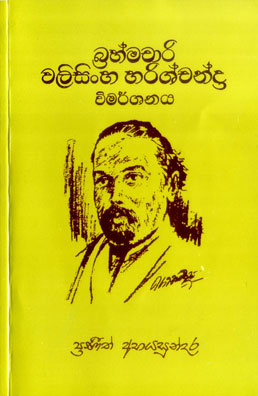Epic life of a spiritual activist
by Kalakeerthi Edwin Ariyadasa
A hero is someone who has given his or her life, to something bigger
than oneself.
Joseph Campbell
 An English saying avers: “Cometh the moment, cometh the man”. In the
history of any nation, this observation is emphatically applicable. An English saying avers: “Cometh the moment, cometh the man”. In the
history of any nation, this observation is emphatically applicable.
In the early history of this land, our new nation's independence was
tragically threatened by a band of invading adventurers. The indigenous
rulers of the day were rendered pathetically helpless. Our gentle
compassionate way of life, seemed on the verge of erosion.
The ‘moment’ had arrived.
And, true to the adage, ‘came the man'.
He emerged from the deep south.
Total self-rule was restored to our Island-citadel.
In defiance of in-coming influences we build a unique culture,
admirably synthesising the spiritual and the worldly.
British Empire
That “Man of the Moment”, from the deep south-king Dutugemunu was
followed by 171 rulers. The rule of this land, by 186 monarchs, ended
with the country entering into a new phase in its history, as a colony
of the British Empire. Back then, in 1815, we were among the handful of
countries in the world to remain independent over a long period of time.
Our ennobling self-rule, that flourished in this blessed Island over
an extensive era, spanning more than 2,300 years, was handed over to the
representatives of Imperialism, by a power-crazy coterie of man, led
astray by their narrow, selfish and petty ambitions.
Imperialist rulers went to work, pursuing their agendas relentlessly.
They followed policies to prevent the masses of the land integrating
into a solid, unified nationhood. Wherever possible, they did their best
to thwart the hold of traditional and indigenous values as these bred a
potent patriotic pride. In the face of Imperialist ruler, the
long-cherished national identity, had begun to fade, yielding place to a
demeaning, slavish state of mind.
Colony
Of course, the officers of the Empire, imposing a sturdy and stern
rule over their colony, did what comes naturally to the Imperialist.
But, it was the people in the culturally and spiritually downtrodden
land who had to do the making-up.
Time had come to stir up the people to open their eyes and look.
But, who will do this nudging and the prodding?
Once again the “moment” had come. And this time around there came a
group of like-minded men, to meet the ‘moment'.
They were a trio. One from the US-Col. Henry Steel Olcott.
The second was Anagarika Dharmapala.
The Third, less reputed than the above two, but equally dedicated was
Brahmachari Walisinghe Harischandra.
Fresh interest
Currently a fresh interest is being taken in Brahmachari Walisinghe
Harischandra, as September 13 marked the centenary of his death.
But, I find an important, preliminary duty to perform.
Under the patronage of president Jagath Sumathipala, of the
All-Ceylon Buddhist Congress a biographical study of Brahmachari
Walisinghe Harischandra has just been brought out. It is the work of
author Dr. Praneeth Abhayasundara. Its stunning and overwhelming
dedication to details sweeps you off your feet. You cannot help but be
fully and totally surprised by this discipline.
Recording the Brahmachari's sea-voyage debut, the book notes: “The
ship left Colombo harbour at 7.45 a.m. That day. The boat he travelled
in was named “Deupholix”.
His passport number was 129. After a sea voyage of six-days he landed
at Calcutta at 2.45 p.m. on the March 8. Duchess Canarora and Bhikkuni
Dhammadinna were awaiting to welcome him, at the port”.
Stature
Col Olcott and Anagarika Dharmapala are international stalwarts with
an exceptionally high profile in the Buddhist and cultural renaissance
of Sri Lanka.
But, Brahmachari Walisinghe Harischandra did not achieve that high
stature in terms of name and fame. But the contribution he made to
national awakening is not at all, less epoch-making.
All these cultural heroes had to make extensive sacrifices. Their
lives symbolise traditional renunciation. Anagarika Dharmapala gave up a
substantial fortune.
Brahmachari Walisinghe Harischandra, had a ready-made legal success
if he continued. He abandoned that prioritising the need to initiate the
spiritual awakening.
A stray item of memory that lingers within me is the studying of his
highly instructive book on archaeology (Puravidyawa). As a child I found
it engrossing reading capable of generating a profound proud and awe
towards our cultural and spiritual heritage.
Spiritual activist
This work on the Brahmachari takes the evolution of a spiritual
activist, propelled by an undiminishing missionary zeal.
He was a religious orator with a spell-binding earnestness. In the
history of this cultural awakening, he is known largely as a supportive
talent that remained loyal to peerless Anagarika Dharmapala. But, on his
own too, he has made his presence felt at a number of levels. He
authored several books which remain impressive contributors.
His span of existence on earth was suddenly short. He passed away
when he was 37 years old, a victim of cancer.
The book chronicles in all detail, his last days and the funeral
rites held for him.
In today's context, due to the social and technological changes that
have taken place since his time, the physical suffering he endured would
not be called for.
But the emphatic lesson the world desires is the stark honesty and
commitment.
He was never a placard-holding activist whose devotion is strictly
limited to the display of slogans.
He immersed himself in the mission of mass-redemption – sacrificing
everything he had, even the very last breath. |


